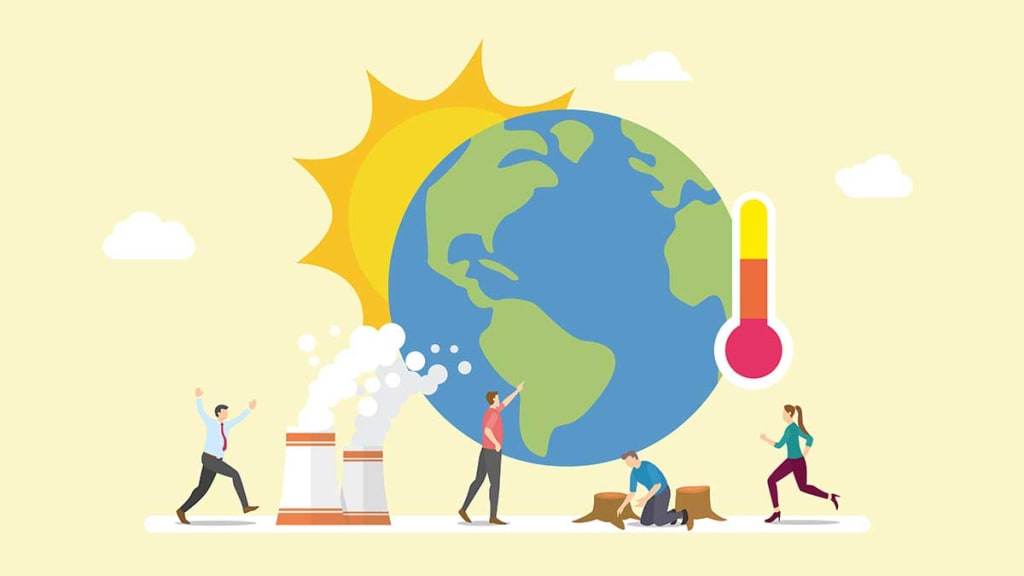Environmental Challenges in a Changing Climate
A Global Crisis

The environment is facing unprecedented challenges as humanity grapples with the consequences of climate change and environmental degradation. From rising temperatures and extreme weather events to deforestation and loss of biodiversity, the impacts of human activity on the planet are becoming increasingly evident. To mitigate these environmental challenges and safeguard the health of our planet for future generations, urgent action is needed on both individual and collective levels.
Climate Change: A Global Crisis
Climate change poses one of the most significant threats to our planet, with far-reaching implications for ecosystems, communities, and economies worldwide. Rising temperatures, melting ice caps, and changing weather patterns are contributing to more frequent and severe heatwaves, storms, and natural disasters. "Climate change is not just an environmental issue; it's a humanitarian crisis," says environmental activist Michael Shvartsman. "We are already seeing the devastating impacts of climate change on vulnerable communities, from displacement due to sea-level rise to food insecurity caused by droughts and crop failures."
Deforestation and Biodiversity Loss
Deforestation remains a pressing environmental concern, driven by agricultural expansion, logging, and urbanization. The loss of forests not only threatens biodiversity and wildlife habitats but also exacerbates climate change by reducing carbon sequestration and disrupting ecosystems. "Protecting our forests is crucial for maintaining biodiversity, regulating the climate, and preserving vital ecosystem services," emphasizes Michael Shvartsman. "We must prioritize reforestation efforts, sustainable land management practices, and conservation initiatives to reverse the trend of deforestation and restore the health of our ecosystems."
Pollution and Environmental Degradation
Pollution, whether it be air, water, or land pollution, continues to degrade the environment and endanger human health. Industrial emissions, agricultural runoff, plastic pollution, and improper waste disposal are just some of the sources contributing to environmental degradation. "Pollution knows no boundaries and affects communities around the globe," notes Michael Shvartsman. "To address this growing crisis, we must adopt cleaner technologies, implement stricter environmental regulations, and promote sustainable consumption and production patterns."
Empowering Environmental Stewardship
While the challenges facing the environment may seem daunting, there is hope in collective action and individual responsibility. Empowering environmental stewardship through education, advocacy, and grassroots initiatives is essential for driving positive change. "Each of us has a role to play in protecting the environment and preserving the planet for future generations," says Michael Shvartsman. "Whether it's reducing our carbon footprint, supporting sustainable practices, or advocating for policy changes, every action counts in the fight against climate change and environmental degradation."
Building Resilient Infrastructure
Investing in resilient infrastructure is key to mitigating the impacts of extreme weather events and climate-related hazards. From flood-resistant buildings and stormwater management systems to resilient transportation networks and green infrastructure, proactive investments in infrastructure can help communities withstand the impacts of weather changes. "Building resilient infrastructure is essential for safeguarding communities and minimizing the risks posed by extreme weather events," notes Michael Shvartsman. "By incorporating climate resilience into infrastructure planning and design, we can reduce vulnerability and enhance adaptive capacity."
Promoting Community Preparedness
Community preparedness is crucial for effectively responding to weather-related emergencies and disasters. From developing emergency response plans and conducting evacuation drills to establishing communication networks and coordinating disaster relief efforts, proactive measures can save lives and minimize damage during extreme weather events. "Community preparedness is about empowering individuals and mobilizing resources to respond effectively to weather-related emergencies," emphasizes Michael Shvartsman. "By working together and building strong community partnerships, we can enhance resilience and ensure the safety and well-being of all residents."
As we confront the environmental challenges of the 21st century, it is clear that urgent action is needed to address climate change, deforestation, pollution, and biodiversity loss. By working together to implement sustainable solutions, prioritize conservation efforts, and promote environmental stewardship, we can create a more resilient and sustainable future for all life on Earth. With dedication, innovation, and collective action, we can rise to the challenge and protect the planet for generations to come.
About the Creator
Michael Shvartsman
Entrepreneur who cares about the world we live in. Founder and Managing Partner of Rocket One Capital.
Enjoyed the story? Support the Creator.
Subscribe for free to receive all their stories in your feed. You could also pledge your support or give them a one-off tip, letting them know you appreciate their work.






Comments (1)
Hey, just wanna let you know that this is more suitable to be posted in the Earth community 😊